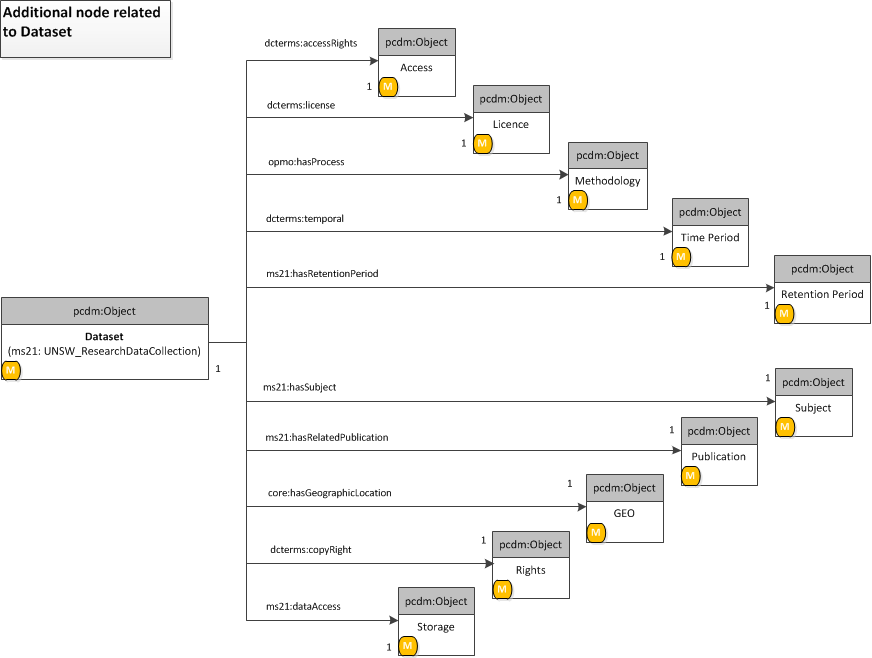...
Namespace | URL |
fedora | |
dc | |
| access |
Fedora 4 data model for ResData
Figure 1 below presents a top level view of the Fedora 4 data model for ResData.
Figure 1: Fedora 4 data model for ResData
ResData Ontology Classes
The ResData Fedora 4 data model is an adaptation of the PCDM model, integrated with a customised version of ANDS VITRO ontology. The resultant ontology consists mainly of the following classes:
...
Activities, Datasets, Parties (pcdm:Collection)
Activities, Datasets, and Parties are Fedora 4 container nodes of pcdm:Collection type, mainly intended to enable grouping of the three main ResData resource types, i.e. Activity, Dataset and Party. Fedora 4 URI structures for these pcdm:Collection containers are listed below:
Container name | URL |
Activities | /rest/activities |
Datasets | /rest/datasets |
Parties | /rest/parties |
Dataset (VITRO-ANDS:ResearchData, pcdm:Object)
The ResearchData class from the ANDS VITRO ontology is used to define the Dataset resource type in ResData. In the Fedora 4 model for ResData, all instances of the ResearchData class are also defined as nodes of pcdm:Object type with a number of data properties containing descriptive metadata, and object properties containing reference to other related ResData resources, such as Activity (vivo:ResearchActivity), Party (foaf:Person) and other Dataset resources. Figure 2 bellow illustrates the combined use of pcdm:Object and VITRO-ANDS:ResearchData classes to represent various ResData resource types.
Figure 2: ResData Dataset resource defined as pcdm:Object
Fedora 4 URI structures for ResData Dataset-related nodes are as below:
Description | URL |
Dataset | /rest/datasets/[dataset pairtree id] |
Access | /rest/datasets/[dataset pairtree id]/access |
Licence | /rest/datasets/[dataset pairtree id]/licence |
Methodology | /rest/datasets/[dataset pairtree id]/methodology |
Time Period | /rest/datasets/[dataset pairtree id]/timePeriod |
Retention Period | /rest/datasets/[dataset pairtree id]/retentionPeriod |
Subject | /rest/datasets/[dataset pairtree id]/subject |
Publication | /rest/datasets/[dataset pairtree id]/publication |
GEO | /rest/datasets/[dataset pairtree id]/geo |
Rights | /rest/datasets/[dataset pairtree id]/rights |
Storage | /rest/datasets/[dataset pairtree id]/storage |
ms21:PartyRelation
PartyRelation is a custom class for describing a user-specified relation between a Party and a Dataset. Instances of PartyRelation in the ResData Fedora 4 model are also defined as pcdm:Object type nodes.
Fedora 4 URI structures for the PartyRelation nodes are:
Description | URL |
Dataset | /rest/datasets/[dataset pairtree id] |
PartyRelation | /rest/datasets/[dataset pairtree id]/partyRelation1 |
ms21:ResourceRelation
ResourceRelation is a custom class for describing user-defined relationships between Dataset resources. Instances of ResourceRelation in the ResData Fedora 4 model are also defined as pcdm:Object type nodes.
Fedora 4 URI structures for the ResourceRelation nodes are:
Description | URL |
Dataset | /rest/datasets/[dataset pairtree id] |
ResourceRelation | /rest/datasets/[dataset pairtree id]/resourceRelation1 |
Activity (vivo:ResearchActivity, pcdm:Object)
The ResearchActivity class from the VIVO ontology is used to define Activity type resources in ResData. In the Fedora 4 model for ResData, all instances of the ResearchActivity class are also defined as nodes of pcdm:Object type with a number of data properties containing descriptive metadata and object properties containing reference to additional information about a research project, including funding body and affiliation. Figure 3 bellow illustrates how pcdm:Object and vivo:ResearchActivity classes are combined to represent Activity-type resources in ResData Fedora 4 model.
Figure 3: Activity-type resources in Fedora 4 model for ResData
Fedora 4 URI patterns for ResData Activity-type resources are:
Description | URL |
Activity | /rest/activities/[activity pairtree id] |
Funding | /rest/activities/[activity pairtree id]/funding |
Organisation | /rest/activities/[activity pairtree id]/organisation |
Party (foaf:Person, pcdm:Object)
Similar to Dataset and Activity, all Party-type resources are defined as instances of both the Person class from the FOAF ontology and the pcdm:Object class (Figure 4).
Figure 4: ResData Party defined as pcdm:Object
Fedora 4 URI patterns for ResData Party-type resources:
Description | URL |
Activity | /rest/parties/[party pairtree id] |
Funding | /rest/parties/[party pairtree id]/organisation |
ResData Namespaces
Namespace | URL |
bibo | |
owl | |
ms21 | http://www.unsworks.unsw.edu.au/ontology/preservation-metadata/ |
VITRO-ANDS | |
core | |
foaf | |
pcdm |
UNSWorks Data Model
Figure 5: UNSWorks Data Model
Note: All classes are derived from existing classes used on Fedora 3 used in RELS-INT and RELS-EXT
...
Property | Sub-property of | Range | Note |
unsworksp:migratedFrom |
|
|
unsworksp:rights
Rights class individual represent a licence or agreements that author of the electronic resource has signed. Similar to resource, it can link to same type another metadata for preservation purpose
...
Datastream types (inline, managed, redirect, and external)
Identifiers
The PairTree algorithm is the default method for generating identifiers in Fedora 4 default. This method will be used for the migration and a new object to address the performance issue about limiting the number of children under a single resource (Performance). As for the legacy PID, it will be stored as a property of the node as mentioned above. For example, refer to the URL structures on Data Model section.
Indexing strategies (GSearch, RI-Search vs. F4 approaches)
...








